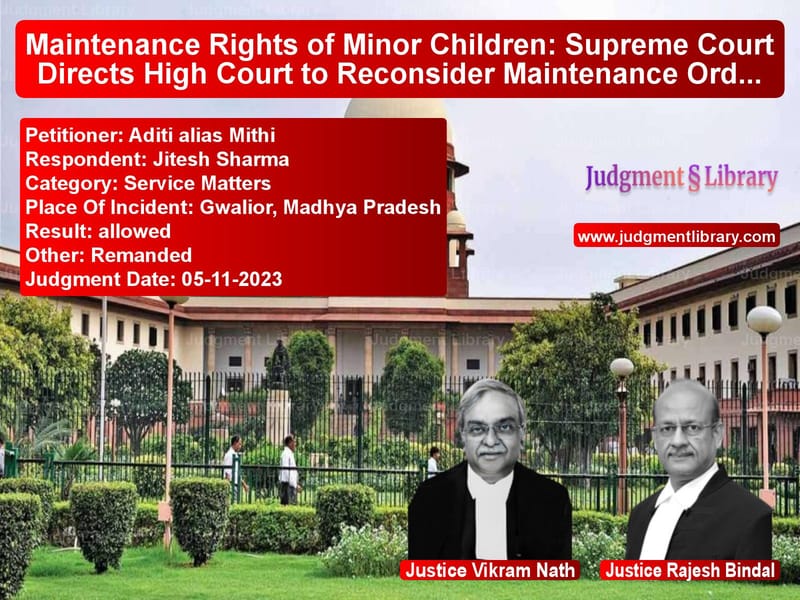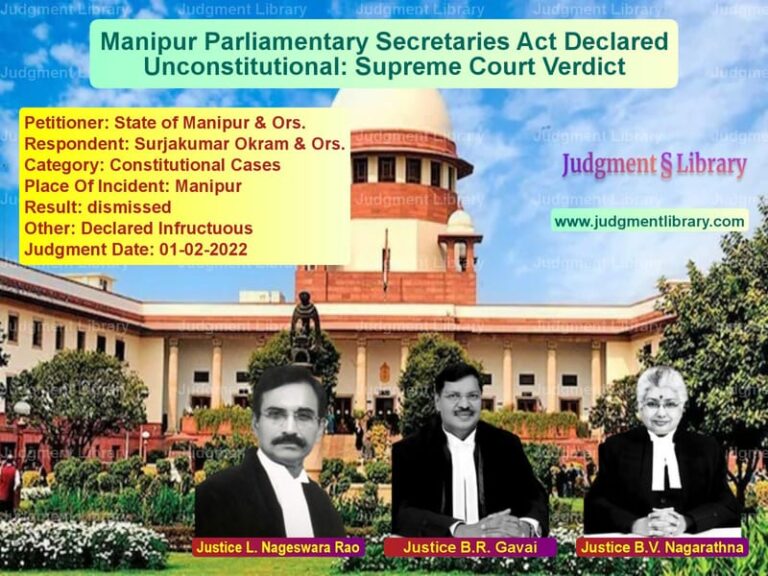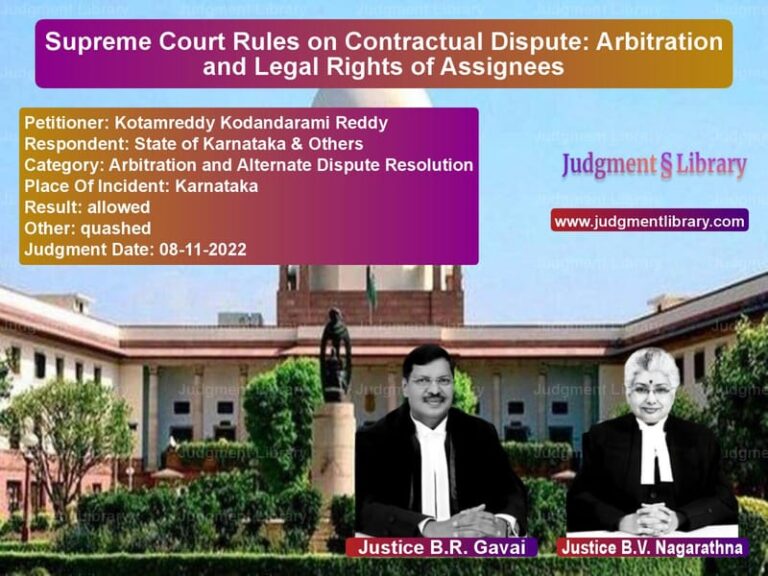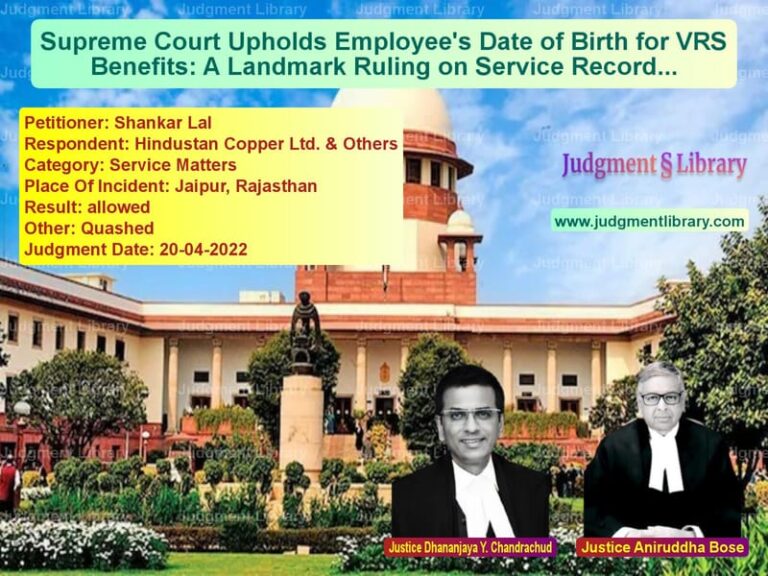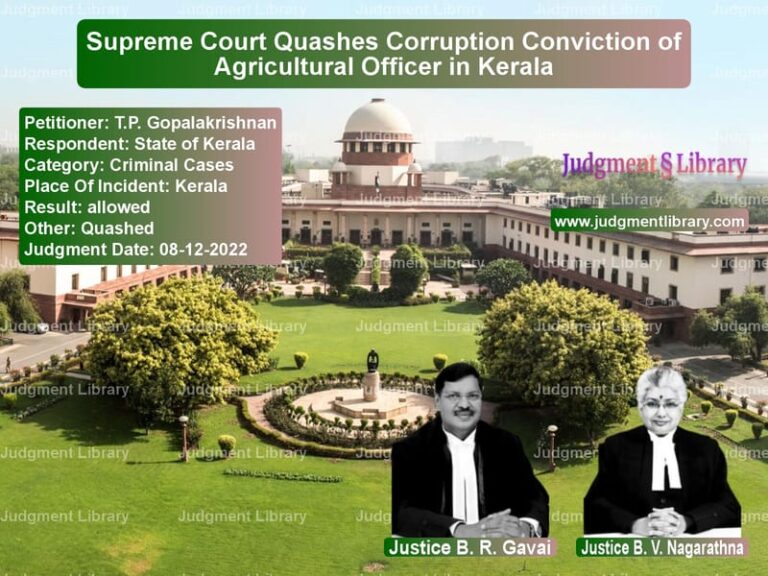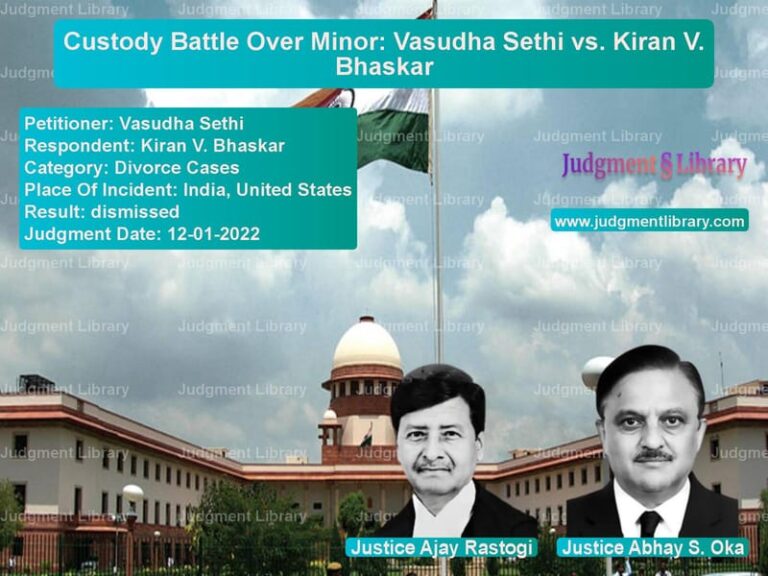Maintenance Rights of Minor Children: Supreme Court Directs High Court to Reconsider Maintenance Order
The case of Aditi alias Mithi v. Jitesh Sharma revolves around the issue of maintenance for a minor child under Section 125 of the Criminal Procedure Code (Cr.P.C.). The Supreme Court of India had to determine whether the High Court was justified in reducing the maintenance awarded by the Family Court. The judgment underscores the importance of procedural fairness, adherence to legal precedents, and the duty of parents to support their children irrespective of marital disputes.
Background of the Case
The case originated from a dispute over maintenance filed by the appellant, Aditi alias Mithi, a minor daughter represented by her mother, against the respondent, Jitesh Sharma, her father. The parents of the appellant were married in 2008, and they had two children—a son and a daughter. The father retained custody of the son, while the mother took care of the daughter.
In January 2018, the respondent filed a divorce petition before the Family Court. In May 2018, the appellant and her mother filed an application under Section 125 Cr.P.C. seeking maintenance from the respondent. On September 10, 2022, the Family Court granted a divorce to the respondent-husband and, on November 30, 2022, it awarded the appellant ₹20,000 per month as maintenance, while denying maintenance to her mother.
However, on June 28, 2023, the Madhya Pradesh High Court at Gwalior, in a criminal revision petition filed by the respondent, reduced the maintenance from ₹20,000 per month to ₹7,500 per month, citing the respondent’s financial distress.
Arguments Presented Before the Supreme Court
1. Arguments by the Appellant
The appellant, through her counsel, challenged the High Court’s decision, arguing:
- The Family Court had considered all relevant factors before awarding ₹20,000 per month.
- The High Court’s order was cryptic, lacked reasoning, and arbitrarily reduced the maintenance amount.
- The respondent had failed to fulfill his parental obligations and was trying to evade financial responsibility.
- Despite being served notice, the respondent had refused to appear before the Supreme Court, indicating his reluctance to provide for his child.
2. Findings and Observations of the Supreme Court
The Supreme Court, after reviewing the facts of the case and the legal framework governing maintenance, found several procedural and substantive issues with the High Court’s decision. The Court emphasized that maintenance orders must be based on a careful assessment of financial disclosures by both parties.
The Court relied on its landmark ruling in Rajnesh v. Neha and Another (2021) 2 SCC 324, which provided comprehensive guidelines for determining maintenance, including:
- Requiring both parties to file affidavits disclosing their income, assets, liabilities, and expenditures.
- Ensuring that courts consider all relevant financial factors, including standard of living and education expenses of children.
- Mandating that maintenance be awarded in a manner that upholds the dignity and well-being of the dependent spouse and children.
The Supreme Court found that the High Court had failed to follow these guidelines and had arbitrarily reduced the maintenance amount without proper justification.
Key Observations of the Supreme Court
1. Duty of a Parent to Maintain a Child
The Supreme Court reaffirmed that a father cannot evade his responsibility to maintain his child, regardless of financial difficulties. Citing Neha Tyagi v. Lt. Col. Deepak Tyagi (2022) 3 SCC 86, the Court held:
“The father is not absolved of his liability and responsibility to maintain his child till he attains the age of majority. Whatever be the dispute between the husband and the wife, a child should not be made to suffer.”
2. Non-Compliance with Financial Disclosure Rules
The Supreme Court noted that there was no record of the parties submitting affidavits as per the guidelines set in Rajnesh v. Neha. This failure resulted in an arbitrary decision by the High Court, which did not consider the full financial status of the respondent.
3. Need for Reasoned Judicial Orders
The Court criticized the High Court’s cryptic and unreasoned order, emphasizing that maintenance orders should be supported by proper reasoning and evidence. It held that judicial orders impacting the financial well-being of minor children must be based on a transparent assessment of financial disclosures.
4. Procedural Compliance and Judicial Training
The Supreme Court observed that, despite its judgment in Rajnesh v. Neha, many courts across India were still failing to adhere to the mandatory guidelines for maintenance cases. To address this issue, the Court directed the Secretary-General to re-circulate the Rajnesh v. Neha judgment to all High Courts, judicial academies, and family courts to ensure strict compliance.
Final Judgment
The Supreme Court set aside the High Court’s order reducing the maintenance and remanded the case back to the High Court for fresh consideration in light of the principles laid down in Rajnesh v. Neha. The Court further directed the High Court to issue a notice to the respondent and obtain his financial disclosures before passing any fresh order.
Implications of the Judgment
1. Strengthening the Rights of Minor Children
This judgment reinforces the principle that children have an inalienable right to financial support from their parents. Courts must ensure that maintenance awards reflect the genuine needs of the child and are not reduced arbitrarily.
2. Ensuring Fairness in Maintenance Proceedings
By reiterating the guidelines in Rajnesh v. Neha, the Supreme Court has strengthened procedural fairness in maintenance cases. Mandatory financial disclosures by both parties will ensure that maintenance awards are based on objective criteria.
3. Judicial Accountability and Training
The directive to recirculate the Rajnesh v. Neha judgment ensures that lower courts follow uniform and transparent procedures in maintenance cases, thereby reducing arbitrary decisions and unnecessary litigation.
Conclusion
The Supreme Court’s decision in this case is a landmark ruling on the rights of minor children in maintenance disputes. By directing the High Court to reconsider its order in light of financial disclosures and legal precedents, the judgment ensures that maintenance awards are fair, transparent, and in the best interests of the child. The ruling serves as a reminder to courts across India to strictly adhere to established legal guidelines when deciding maintenance claims, thereby upholding the principles of justice and child welfare.
Petitioner Name: Aditi alias Mithi.Respondent Name: Jitesh Sharma.Judgment By: Justice Vikram Nath, Justice Rajesh Bindal.Place Of Incident: Gwalior, Madhya Pradesh.Judgment Date: 05-11-2023.
Don’t miss out on the full details! Download the complete judgment in PDF format below and gain valuable insights instantly!
Download Judgment: aditi-alias-mithi-vs-jitesh-sharma-supreme-court-of-india-judgment-dated-05-11-2023.pdf
Directly Download Judgment: Directly download this Judgment
See all petitions in Alimony and Maintenance
See all petitions in Child Custody
See all petitions in Divorce by Desertion
See all petitions in Judgment by Vikram Nath
See all petitions in Judgment by Rajesh Bindal
See all petitions in allowed
See all petitions in Remanded
See all petitions in supreme court of India judgments November 2023
See all petitions in 2023 judgments
See all posts in Service Matters Category
See all allowed petitions in Service Matters Category
See all Dismissed petitions in Service Matters Category
See all partially allowed petitions in Service Matters Category

